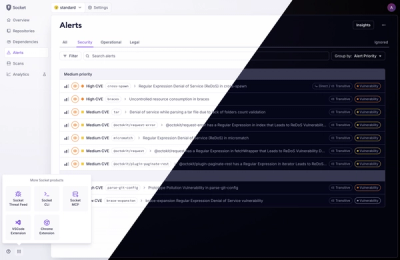
Product
A Fresh Look for the Socket Dashboard
We’ve redesigned the Socket dashboard with simpler navigation, less visual clutter, and a cleaner UI that highlights what really matters.
Easy to use Python file conversion API with support for 1,100+ file conversions - convert documents, audio, images,
video, eBooks and more. Use zamzar-python to convert files between different formats as part of your Python
application with the Zamzar file conversion API. Common use cases include:
This is the official Python SDK for the Zamzar API.
Jump to:
You can install the Zamzar Python SDK using pip:
pip install --upgrade zamzar
Please follow the installation instructions and execute the following Python code:
from zamzar import ZamzarClient
zamzar = ZamzarClient("YOUR_API_KEY_GOES_HERE")
zamzar.convert("/tmp/example.docx", "pdf").store("/tmp/").delete_all_files()
See the examples to learn more about how to use the Zamzar Python SDK.
Whilst developing your application, you can use the lZamzar sandbox environment to test your code without consuming production credits:
from zamzar import ZamzarClient, Environment
zamzar = ZamzarClient("YOUR_API_KEY_GOES_HERE", environment=Environment.SANDBOX)
The Zamzar Python SDK uses the production environment by default, but you can also specify it explicitly:
from zamzar import ZamzarClient, Environment
zamzar = ZamzarClient("YOUR_API_KEY_GOES_HERE", environment=Environment.PRODUCTION)
By default, the Zamzar Python SDK does not log HTTP requests and responses. To enable logging, configure a
logging.Logger for urllib3:
import logging
from zamzar import ZamzarClient
# Configure logging as needed. Here we configure a simple console logger
console_handler = logging.StreamHandler()
console_handler.setLevel(logging.DEBUG) # Set the logging level for the console handler
console_formatter = logging.Formatter('%(asctime)s - %(name)s - %(levelname)s - %(message)s')
console_handler.setFormatter(console_formatter)
root_logger = logging.getLogger()
root_logger.addHandler(console_handler)
logging.basicConfig(level=logging.DEBUG, format='%(asctime)s - %(name)s - %(levelname)s - %(message)s')
# Enable logging for urllib3 to see HTTP requests
urllib3_logger = logging.getLogger('urllib3')
urllib3_logger.setLevel(logging.DEBUG)
# Make a request to the Zamzar API
zamzar = ZamzarClient("YOUR_API_KEY_GOES_HERE")
zamzar.account.get()
The Zamzar Python SDK will automatically:
The default settings are defined in ZamzarClient.
To override these defaults, configure your
own urllib3.Retry and pass it
to the ZamzarClient constructor:
import urllib3
from zamzar import ZamzarClient
# Configure a custom retry policy
custom_policy = urllib3.Retry(
total=5, # Maximum number of retries
backoff_factor=1, # Exponential backoff factor
backoff_max=60, # Maximum backoff time
status_forcelist=[429, 502, 503, 504], # HTTP status codes to retry
allowed_methods=None # retry all request methods
)
# Make a request to the Zamzar API
zamzar = ZamzarClient("YOUR_API_KEY_GOES_HERE", retries=custom_policy)
Code Samples - Copy/Paste from examples which demonstrate all key areas of functionality.
Developer Docs - For more information about API operations, parameters, and responses. Use this if you need additional context on all areas of functionality.
FAQs
Official Python client for the Zamzar API
We found that zamzar demonstrated a healthy version release cadence and project activity because the last version was released less than a year ago. It has 1 open source maintainer collaborating on the project.
Did you know?

Socket for GitHub automatically highlights issues in each pull request and monitors the health of all your open source dependencies. Discover the contents of your packages and block harmful activity before you install or update your dependencies.

Product
We’ve redesigned the Socket dashboard with simpler navigation, less visual clutter, and a cleaner UI that highlights what really matters.

Industry Insights
Terry O’Daniel, Head of Security at Amplitude, shares insights on building high-impact security teams, aligning with engineering, and why AI gives defenders a fighting chance.

Security News
MCP spec updated with structured tool output, stronger OAuth 2.1 security, resource indicators, and protocol cleanups for safer, more reliable AI workflows.